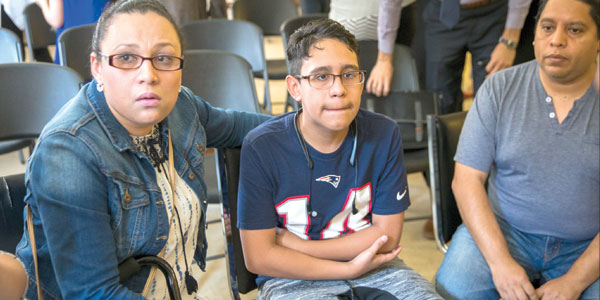
By Jorge Ramos
MIAMI — If Jonathan Sánchez is deported to Honduras, he will die.
The 16-year-old suffers from cystic fibrosis, the same illness that killed his older sister, though the government official who sent Jonathan’s parents a letter telling them that they all should leave the United States within a month didn’t seem to care.
That letter was essentially a death sentence for Jonathan.
“What will happen if you are sent back to Honduras?” I asked him during an interview via satellite, shortly after his parents had received the letter. “Well … basically, I will die,” he told me.
Jonathan was talking to me from near Boston Children’s Hospital, where he receives a treatment that is helping him deal with a lethal cough. Among other things, cystic fibrosis causes a buildup of mucus in the lungs that cannot be removed.
“This has happened before,” he told me. “If I miss treatment one day, I start coughing a lot. I get tired. I find it hard to breathe. I have stomach aches and can’t digest food.”
America’s war against immigrants is now targeting the weakest and most vulnerable. Not content with separating children from their parents at the border, placing minors behind bars or threatening to put an end to birthright citizenship for children born on American soil to undocumented parents, the Trump administration is now going after children like Jonathan, with life-threatening illnesses.
The government is doing everything it can to limit the number of foreigners coming to the United States, particularly those from Latin America. (Let’s not forget President Trump’s remarks in June 2015 about Mexican immigrants: “They’re bringing drugs. They’re bringing crime. They’re rapists.”) The 2020 presidential campaign will be a battle over what kind of country we want to be.
Jonathan and his parents, Gary and Mariela, entered the United States three years ago on tourist visas. They then applied to stay in the country on medical grounds under the federal government’s “deferred action” program so that Jonathan could receive treatment. Roughly 1,000 people benefit from the lifesaving program each year, according to a recent report in The Times.
However, last month, without any advance warning or formal announcement, U.S. Citizenship and Immigration Services, the agency responsible for issuing these immigration permits, decided to cancel most of them. The withering message, in Jonathan’s words, was: “basically, that I must leave the country within 33 days or I will be deported.”
Mariela, Jonathan’s mother, couldn’t believe it, so she called the agency for an explanation. “They just said that our application had been denied,” she told me. “That our extension could not be granted. It was a complete shock for us.”
The Sánchez family has already been through tough times; they are well aware of what lies ahead. Jonathan’s older sister died in Honduras from cystic fibrosis.
“When our daughter was born, the doctors didn’t have a clue in terms of a diagnosis,” Gary recalled. “Nobody knew what disease it was.” Desperate, the family sent a frozen sample of their daughter’s blood to the United States for analysis.
The results were sent back to Honduras: It was cystic fibrosis. Unfortunately, it was too late to act. She had already died. Fearing that Jonathan would suffer the same fate, the Sánchez family traveled to the United States so he could be treated.
The last time I spoke to Gary, he sounded disheartened. “At this moment, we appear to be short of options,” he said. “We simply don’t know what to do. We have been waiting months for the outcome of our application, and suddenly we hear that it’s been denied.”
“Some anti-immigrant folks like to say: ‘We’re not against immigration, we’re against “illegal” immigration,’ ” Alexandria Ocasio-Cortez, the congresswoman from New York, posted on Twitter recently. “If that were true, then we would make documented immigration easy & safe. But each & every day, this administration is grinding legal, documented immigration to a halt.”
She’s right. Jonathan and his parents acted within the law. They legally entered the United States, and they applied for the medical permit and renewal through the proper channels. Despite all this, the Trump administration said no. That is, until it suddenly reversed course on Sept. 2.
The president isn’t used to apologizing or changing his mind. On the contrary, he gloats equally about his good and bad decisions. But this time he seems to have yielded to pressure from Jonathan and other patients like him who told their heartbreaking stories online and in the news media.
Even when we are at our most vulnerable, we can always find a way forward by telling our stories. That’s what Jonathan did, and it saved his life.
In a quiet announcement that didn’t include any admission of wrongdoing, officials from the immigration services agency said they would re-evaluate pending medical cases like Jonathan’s. Gary confirmed that the family’s lawyers had, in fact, been directed to reapply for an extension on their behalf. That should keep Jonathan safe for now.
I wish I could say that the moral of this story is that good always triumphs in the end, or that, as some people say, everything happens for a reason.
But I don’t buy any of that. No, I think this whole situation has a far simpler explanation: President Trump leads one of the most virulently anti-immigrant administrations since 1954, when “Operation Wetback” resulted in the deportation of one million Mexicans. In its efforts to reduce immigration levels and reverse the nation’s increasingly diverse demographic trends, the Trump administration is targeting even those migrants who are suffering life-threatening illnesses.
I asked Jonathan what he would say to those who wanted to deport him. “Please don’t kill me,” was his response.
Nothing is more compelling and moving than a child fighting for his own life.
____________________________________________________________________________________________
‘Si Me Regresan, Me Muero’
El gobierno de Trump quiso suspender los permisos a migrantes que reciben atención médica de vida o muerte. al final, reconsideró esta decisión por historias como la de Jonathan Sánchez, quien podría morir sin su tratamiento.
MIAMI — Si deportan a Jonathan Sánchez a Honduras se va a morir. Este joven de 16 años sufre de fibrosis quística. Su hermana mayor murió de la misma enfermedad que, entre otras cosas, atasca los pulmones con flemas imposibles de sacar. Pero esa tos letal no pareció importarle al funcionario que les envió una carta al padre y la madre de Jonathan diciéndoles que la familia tenía 33 días para irse de Estados Unidos.
Para Jonathan, esa carta era una sentencia de muerte.
¿Qué pasa si te regresan a Honduras?, le pregunté en una entrevista vía satélite, poco después que recibieran la carta. “Pues, básicamente, la muerte”, me contestó, cerca del Children’s Hospital en Boston, donde recibe el tratamiento que lo ha mantenido con vida. “Me ha pasado en ocasiones que si no hago el tratamiento por un día, empiezo a toser bastante. Me canso. Me cuesta respirar bastante. Sufro de dolores de estómago y no suelo digerir bien la comida. Eso es lo que me pasa si no los hago en un día”.
La guerra contra los inmigrantes en Estados Unidos se está extendiendo hacia los más débiles. Ya no se trata, sólo, de separar a niños de sus padres en la frontera, de poner a menores de edad en jaulas o de considerar quitarles la ciudadanía automática a los hijos de indocumentados nacidos en Estados Unidos. Ahora el gobierno del presidente Donald Trump se lanzó en contra de niños enfermos. Como Jonathan.
Hay un esfuerzo concertado del gobierno de Trump para limitar el número total de extranjeros en Estados Unidos, particularmente cuando vienen de América Latina. (No podemos olvidar su mantra de junio de 2015 sobre los inmigrantes mexicanos: “Traen drogas. Traen crimen. Son violadores”.) Y la campaña presidencial de 2020 tiene que definir qué tipo de país queremos ser.
Jonathan y sus papás, Gary y Mariela, entraron como turistas a Estados Unidos hace tres años. Luego solicitaron quedarse a través de un programa médico de acción diferida para que Jonathan pudiera recibir su tratamiento. No es una categoría migratoria muy grande. Pero salva muchas vidas. Cada año, cerca de mil personas son beneficiadas.
Pero el mes pasado, sin ningún aviso previo, la agencia encargada de otorgar esos permisos migratorios —el Servicio de Ciudadanía e Inmigración de Estados Unidos (USCIS)— decidió cancelarlos casi todos. El mensaje para Jonathan fue fulminante: “Debo abandonar el país en 33 días o voy a ser deportado”.
Mariela, la mamá de Jonathan, no lo podía creer y llamó para pedir una explicación. “Sólo nos dijeron que nuestra solicitud había sido negada”, me contó. “Que no podían darnos nuestra extensión”.
Los Sánchez la han pasado mal y ya saben a qué se enfrentan. La hermana mayor de Jonathan murió en Honduras de la misma enfermedad. “Cuando nuestra hija nació, en nuestro país ni siquiera los médicos sabían qué diagnosticar”, me dijo Gary. “Nadie sabía lo que ella padecía”. En un esfuerzo desesperado, le tomaron una prueba de sangre a su hija y la enviaron, congelada, a Estados Unidos. Poco después llegó el resultado a Honduras: efectivamente, padecía de fibrosis quística. Pero la información llegó demasiado tarde. La niña ya había muerto.
Y para no repetir la historia con Jonathan, los Sánchez emprendieron el camino hacia Estados Unidos. Pero cuando hablé con Gary, estaba desesperado. “En este momento no tenemos muchas alternativas. No sabemos qué hacer”, me dijo. “Hemos estado esperando por meses una respuesta y de repente nos dicen que esta es negada”.
“A algunas personas antiinmigrantes les gusta decir: ‘No estamos en contra de la inmigración, sólo estamos en contra de la inmigración ilegal’”, publicó hace poco en Twitter la congresista demócrata, Alexandria Ocasio-Cortez. “Si eso fuera cierto, entonces haríamos que la inmigración legal fuera fácil y segura. Pero cada día este gobierno está deteniendo casi por completo la inmigración legal”.
Es cierto. Jonathan y sus papás hicieron todo legalmente. Entraron a Estados Unidos legalmente, solicitaron su permiso de estadía médica legalmente y tramitaron sus extensiones legalmente. Pero el gobierno de Trump les dijo que no…. hasta el lunes 2 de septiembre.
El Presidente de Estados Unidos no suele disculparse ni da marcha atrás en sus decisiones. Al contrario, le gusta ratificar sus aciertos y sus errores por igual. Pero no pudo contra la presión que Jonathan y otros pacientes le pusieron al gobierno al contar sus desgarradoras historias en los medios de comunicación y en las redes sociales.
Sin mucha publicidad, y sin reconocer ninguna equivocación, el USCIS informó que volverá a considerar solicitudes médicas como la de Jonathan. Gary, me confirmó que, efectivamente, sus abogados recibieron instrucciones para volver a presentar una extensión para los Sánchez. Eso salvaría a Jonathan.
Quisiera escribir que la moraleja de esta historia es que el bien siempre triunfa. O que, como dicen algunos, las cosas siempre pasan por algo. Yo no creo nada de eso. Mi explicación es un poco más realista.
Aquí en Estados Unidos nos estamos enfrentando a uno de los gobiernos más antiinmigrantes desde que en 1954 se deportó a un millón de mexicanos en la llamada Operación Wetback. Y con tal de reducir el número de inmigrantes y tratar de revertir la diversificación de la población, el gobierno de Trump ha iniciado una campaña que va, incluso, contra niños enfermos.
En los momentos de mayor indefensión siempre tenemos un recurso disponible: contar tu propia historia. Jonathan lo hizo y, en el proceso, podría salvarse.
Le pregunté a Jonathan qué le pediría a las personas que lo querían deportar. “Que no me maten”, fue su respuesta, brutal y directa. No hay nada más poderoso y conmovedor que la lucha de un niño por su propia vida. En eso sí creo.










